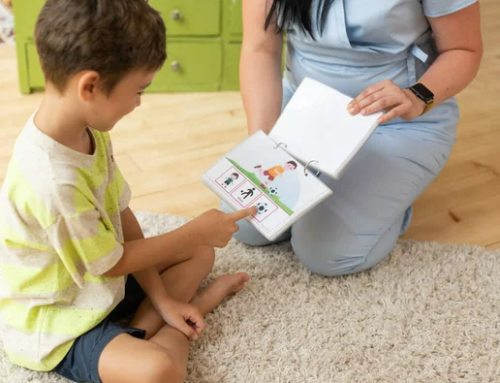One of the many challenges of parenting involves managing difficult behaviours, and in the face of those behaviours, knowing what to do or how to respond. By slowing down and taking a moment to understand a child’s behaviour it becomes easier to decide what happens next, and ultimately will help reduce the occurrence of those behaviours.
It is important to know that all behaviours have a meaning, and by looking for the meaning we can then choose the best way to respond so we can support children and help them learn appropriate ways to express themselves.
Behaviours are our responses and actions to the environment and our emotions. Often behaviours are described as good behaviours (using good manners, sitting patiently) and bad behaviours (stomping, shouting, ignoring), which can lead to all sorts of misconceptions about children as a whole. So, when it comes to behaviour, it is best to view these as a means of expressing something and understanding that all behaviours serve a purpose.
Is the behaviour expressing an emotion?
Just like adults, children need to communicate their emotions in order to cope with them. The difficulty is children don’t always understand what they are feeling and how to manage and express these big feelings, which can mean that feelings come out in interesting ways (behaviours).
For example, a child might be feeling anxious about going to high school, so they might rip up their schoolbooks, or they might hide in their room, or tell you that they feel unwell.
How to respond to emotions?
If your child is expressing a ‘big feeling’ that is coming out as a behaviour we always recommended emotion coaching strategies. Emotion coaching helps in the short term but also helps the child build the skills to identify emotions and manage them independently. This is how emotion coaching works:
- Notice and identify your child’s feelings
- Connect with your child
- Listen with empathy
- Help your child label the feelings
- Set limits while helping your child
- Problem solve
Check out these video to get a better sense of emotion coaching…
Step 1 – An insight into the way feelings can present
Steps 3 & 4 – An insight into resisting temptation to distract and problem solve, instead focusing on validating and listening

Are they testing the limits or pushing boundaries?
Understanding the child’s environment can help us understand why some behaviours are occurring. Has my child had enough sleep? Are they healthy? Are they hungry? These are just some of the setting events for increased likelihood of behavioural outbursts. As adults we know that we aren’t our best selves when we are tired, getting sick or getting hungry and are more susceptible to being grouchy or overreacting to inconveniences. Our kids are the same.
When looking at children’s behaviour it is also important to consider their developmental stage and ensure we have appropriate expectations for their behaviour. For instance, it is entirely age appropriate for children under 5 to have tantrums and have difficulty sharing or for a pre-teen to start testing limits by refusing to engage in tasks or for a teenager to begin distancing themselves from their parents. However, when behaviours are beyond what would be expected for your child’s developmental age and stage, setting appropriate boundaries and limits is encouraged.
How to respond?
While we expect to see some behaviours from children during particular times (feeling sick, change to routine, before lunch) there is always room to help them develop skills. Ensuring we set limits on what is appropriate/expected/ok behaviour and inappropriate/unexpected/not ok behaviours and having natural consequences for these behaviours.
When it comes to limits and consequences, the most effective approach is to clearly outline these prior to an incident. Children find predictability and structure helpful and find coping easier if they know in advance what is going to happen. Be clear with your child on what is expected of them and what will be the consequences should they not meet those expectations.
It is important that we are reasonable and fair with consequences, ensuring that they are appropriately matched to the child’s age and the severity of the behaviour. For example, refusing to complete homework or chores may lead to no access to screen time that evening. But remember, every day is an opportunity for a fresh start.
Allow your child appropriate amounts of choice and control over their environment to increase their sense of accountability and ownership. For instance, “do you want to brush your teeth or put your shoes on first?”
Are they communicating a need?
Children can also have difficulty communicating what is going on for them. Children may express behaviours as a way of having their needs met, for example, they may throw their school book across the room rather than saying “I don’t understand this task”, children may yell and stomp as a way of communicating “Mum I want you to sit with me”.
How to respond?
When a child is communicating an unmet need, it is important that we look beyond the behaviour and find a way to meet the need in a healthy and positive way. This may mean breaking school tasks down into smaller more manageable tasks or scheduling positive time for connection.
We have also created a simple resource for parents to understand how to give you a more in depth explanation of how to use emotion coaching strategies. Click the link to see the resource… Steps to Emotion Coaching Resource
Keep in Mind…
Developing the skills to appropriately communicate emotions and needs is a steady process, remembering even as adults we can still get it wrong sometimes! So, investing some time into emotion coaching, setting limits and being consistent now, will see these skills grow and develop in your child into the future.
Remember, that having a connected and loving relationship with your child is very important. By having fun together, sharing meaningful experiences and giving your child regular, consistent positive attention will support them in feeling safe and secure.
Where can i get help?
If you are finding behaviours to difficult to handle, there are many options for support available including seeing a child behaviour professional e.g. Psychologist, joining a support group and a range of parenting workshops. Beam Health run regular 123 Magic and Emotion Coaching courses for parents, which are a great place to build your skills in managing difficult behaviours.
Sometimes behaviours may be a sign of something more and may require an assessment from a qualified professional such as a Psychologist or Paediatrician.
We would also highly recommend the book “The Whole-Brain Child“ by Dan Siegel.

Sally Speed










